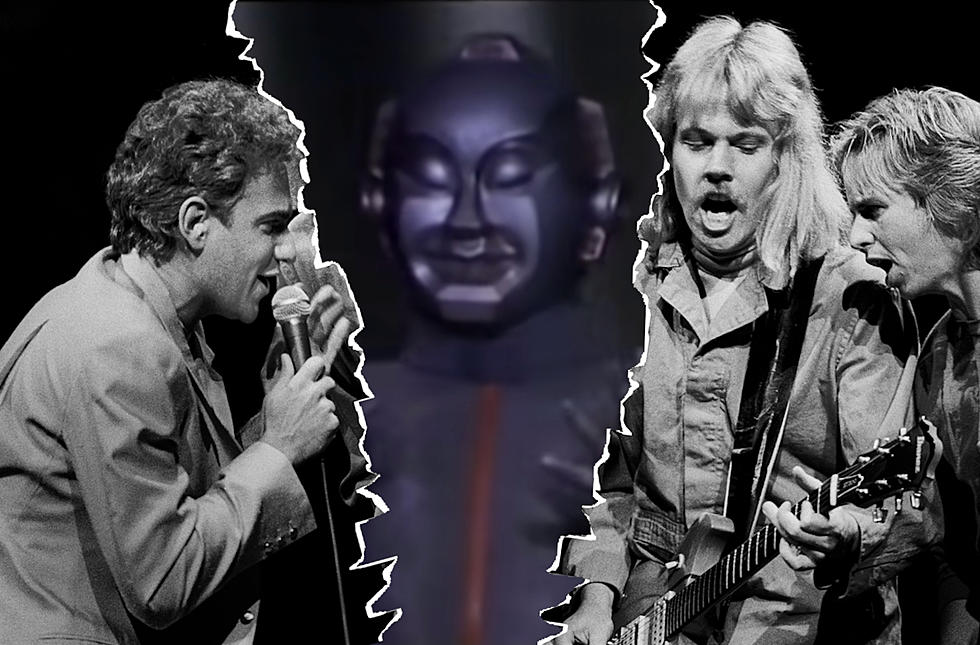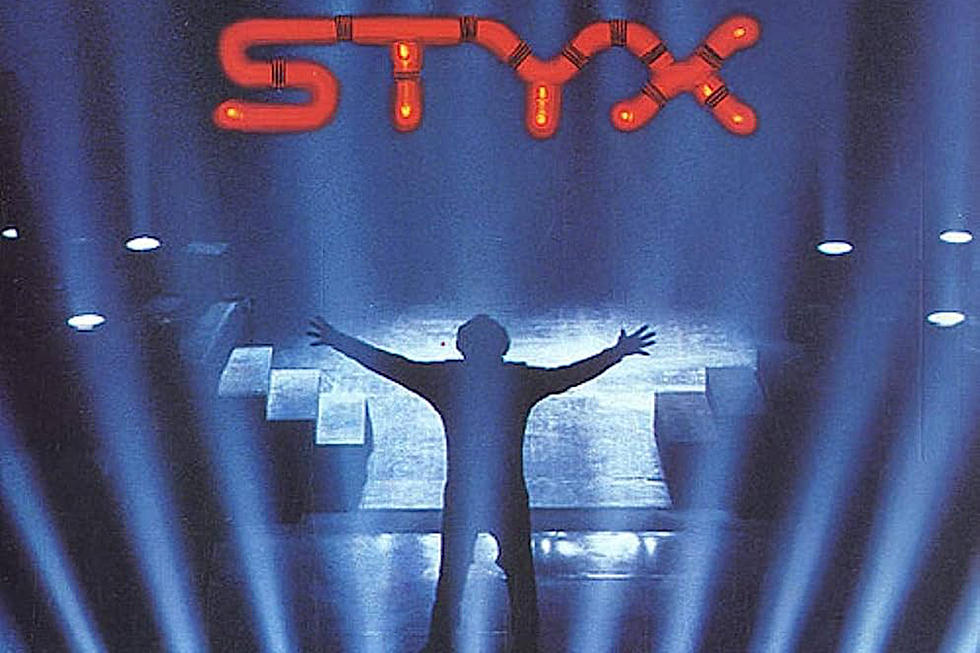
James Young Looks Back on 50 Years of Styx: Exclusive Interview
The roots of Styx began with two fraternal brothers who "fought like hell" but "loved music," as Tommy Shaw recently told fans.
The Panozzo siblings had already been playing music with Dennis DeYoung for close to a decade by the time they solidified the band's lineup with the arrival of guitarists John Curulewski and James "J.Y." Young, who joined in 1969 and 1970 respectively.
Inking their first record contract with Wooden Nickel Records in February 1972 officially started the clock on Styx as a band with a national presence, although it would take them several years to find their footing with radio airplay and record sales. Shaw joined in 1975.
Decades later, the members of Styx are back on the road for the latest run around the country with their former rivals in REO Speedwagon. The current lineup features Young, Shaw, bassist/vocalist Ricky Phillips, keyboardist/vocalist Lawrence Gowan, drummer Todd Sucherman, guitarist/vocalist Will Evankovich and bassist/vocalist Chuck Panozzo, who still makes periodic guest appearances with the group.
We caught up with Young at the start of their Live and UnZoomed tour, which also features Loverboy, to discuss Styx's storied history.
What are some of your first memories of coming across the REO guys?
REO Speedwagon was a band that has had many permutations, even before Styx. I think they formed in Champaign, Ill., at the University of Illinois. I don’t know if everyone was a student there to start. Some of them were, probably. But REO Speedwagon was a factor before Styx signed their first recording contract in 1972. Kevin Cronin grew up not far from where I did, although I never really met the man. He talks about how there was a battle of the bands going back to before any of us had a recording contract. There were high school bands competing in a high school battle of the bands at Brother Rice High School on the south side. I had this lovely blonde female girlfriend who went around and somehow charmed many people to give them their voting tickets. Kevin says, “And that’s why you guys won! Because we should have won that one!” But if it takes a blonde, I’ll find a blonde! [Laughs.]
What did being from Chicago contribute to the spirit of Styx?
Styx were all from the south side of the city, considered the working class side of town. The Panozzo brothers’ dad, he was an employee. Dennis’ dad was an employee of some situation. John Curulewski’s dad was an employee. My grandfather came from Europe and started a business and then my dad took over that business. So I came from business owners. The rest of the guys, their dad had been employees. But when we finally got that thing together, there was a great balance. All of the pieces were in place even though I didn’t necessarily see it at that point in time. Their tastes were so different than mine and I had to learn to compromise, which I was known not to be very compromising. [Laughs.] Dennis and the Panozzos, they were more of a pop cover band, but Dennis and I started writing and then John Curulewski started writing. Ultimately, we got a recording contract in 1972. We signed it on 2/22/72 and just passed the 50th anniversary. So, five decades of Styx and the world still exists. We didn’t kill it.
Watch the Video for 'Mr. Roboto' by Styx
Not even with "Mr. Roboto."
[Laughs] Well, “Mr. Roboto,” I was so against that song – because this thing is targeted at seven year olds. But the craziest thing is, it’s the only 45 RPM single that Styx put out that has sold a million records. I refused to play it, particularly after Dennis was not involved in the band anymore. He didn’t want to go on the road and then sued us over the use of the name and what have you. We went out without him. But maybe two or three years ago, we all sat down. “Okay, we’ve been playing the same songs for a long time. Is there any song that maybe we’re overlooking that the fans really want to hear?” We sat down our merch guy. He gets all of the complaints from people. “How come they didn’t play this? How come they didn’t play that,” as they’re leaving the venue and he’s trying to sell them a shirt. He’ll hear all of the complaints. Plus, our lighting director who has to stand far back in the hall so she can see the full perspective and how to flash this light on that, etc. The two of them said, “The most requested song by people leaving that [you] don’t play is ‘Mr. Roboto.’” So we started playing it again.
Dennis is a very energetic guy. Was he always that way, even in the early days of the band?
Oh yeah, Dennis was the oldest guy in the band and he’s obviously a very talented guy. The Panozzo brothers live down the street from him, so it was kind of natural for them to at least try and work together, which they did. My trademark was “Foxy Lady,” because going to engineering school, I had a guy with electronics who could get the feedback that [Jimi] Hendrix gets at the start of [the song]. I said, “I’ll play whatever you guys want. I just want to be able to do ‘Foxy Lady,’ and I’ll just go along with everything else.” So we did that and then just co-existed. They were a working band, so we were able to make money. I drove a cab part-time in Chicago to make ends meet. It took about a year to get that recording contract and then we devoted the whole thing there. Ultimately, Dennis wrote “Lady,” which was a chart single when it first came out. It got re-released a couple of years later after the third or fourth album came out. That actually charted nationally and got to No. 1 in every market, because the record company finally worked it. We just hadn’t had the juice and our manager was a nobody that was trying to make a name for himself as well, but I don’t think he knew how the game was played. Ultimately, you have to drive down a lot of blind alleys sometimes to really find the open road.
How did "Crystal Ball" evolve from the moment you first heard it?
It was an acoustic thing that Tommy had already written when he came to audition for the band. We had already heard he was great and could play and sing. He was able to replace John Curulewski in that regard, no sweat. Really, that song, we kind of collaborated ultimately on the arrangement, but if you’re going with lyrics and melody, Tommy wrote that. It was easy. [Laughs,] Tommy could play that acoustic and I could play the electric. From there on, we really got to know each other. We had already had success. When “Lady” became a hit, that kind of opened the door for us to get better concert billings. Tommy added [a lot] to the band, because he’s a great showman in his own right and a great singer. The three part harmonies, which were our trademark, taking a Three Dog Night [approach], it kind of went on from there.
I moved in with my better half once we got the recording contract. We weren’t married, [and] that was very much to my parents’ chagrin. Ultimately, I decided, “Well, let’s go to city hall and get married. We don’t have to have a big setting.” So we signed a recording contract in February, released our first record a little bit later on, my better half and I moved in together and then we ultimately got married – all in 1972. So that was kind of the foundation of the whole Styx thing, from my standpoint. Then, Tommy came along in late ‘75 when John decided he was fed up with Dennis. Tommy fit right in and “Crystal Ball,” the song he brought in, became the title of his first album with us.
1972's Best Rock Albums
Real-Life ‘Spinal Tap’ Stories: Styx
More From Ultimate Classic Rock









